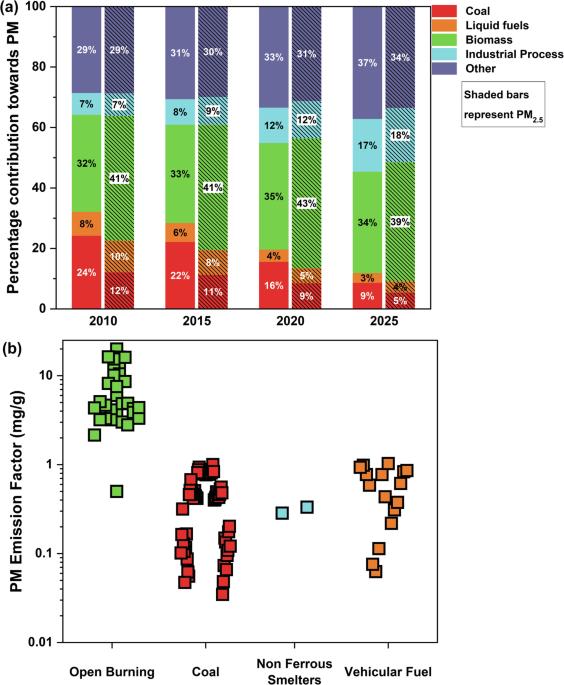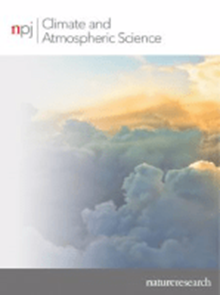Dominance of open burning signatures in PM2.5 near coal plant should redefine pollutant priorities of India
IF 8.5
1区 地球科学
Q1 METEOROLOGY & ATMOSPHERIC SCIENCES
引用次数: 0
Abstract
India, heavily reliant on coal for power generation, has been a significant emitter of particulate matter (PM) bound lead (Pb) and other heavy metals. It is crucial to understand whether implementation of stricter norms in recent years have effectively reduced emissions from coal combustion. This study aims to investigate and quantify the primary sources of PM2.5 in an area housing a major lignite-fired power plant in South India using Pb isotopic compositions and elemental concentrations. Characteristic ratios such as V/Pb and Cu/Pb demonstrate negligible influence from coal combustion, and indicate that summer aerosols are influenced by open burning. In Pb triple-isotope space the PM2.5 aerosols plot away from coal, overlapping with open burning signatures. These indicate that the atmosphere is predominantly influenced by open burning of solid waste and biomass rather than coal combustion, suggesting a promising decrease in coal emissions. Bayesian mixing model demonstrates that solid waste & biomass burning is the largest anthropogenic contributor towards atmospheric Pb (up to 26%), even in a region of coal combustion and presence of medium and small-scale industries. The dominance of open burning as a pollution source in the vicinity of a lignite fired power plant highlights the necessity for better waste management strategies.

煤厂附近的 PM2.5 以露天焚烧为主,应重新定义印度的污染物优先事项
印度严重依赖煤炭发电,一直是含铅(Pb)和其他重金属的颗粒物(PM)的主要排放国。了解近年来实施的更严格规范是否有效减少了燃煤排放至关重要。本研究旨在利用铅同位素组成和元素浓度,调查和量化印度南部一个主要褐煤燃烧发电厂所在地区 PM2.5 的主要来源。V/Pb 和 Cu/Pb 等特征比率表明燃煤的影响微乎其微,并表明夏季气溶胶受到露天燃烧的影响。在铅三重同位素空间中,PM2.5 气溶胶的分布远离煤炭,与露天燃烧特征重叠。这表明大气主要受到固体废弃物和生物质露天焚烧的影响,而不是煤炭燃烧的影响,表明煤炭排放有望减少。贝叶斯混合模型表明,即使在燃煤和存在中小型工业的地区,固体废物和生物质燃烧也是大气中铅的最大人为来源(高达 26%)。露天焚烧是褐煤发电厂附近的主要污染源,这凸显了改善废物管理策略的必要性。
本文章由计算机程序翻译,如有差异,请以英文原文为准。
求助全文
约1分钟内获得全文
求助全文
来源期刊

npj Climate and Atmospheric Science
Earth and Planetary Sciences-Atmospheric Science
CiteScore
8.80
自引率
3.30%
发文量
87
审稿时长
21 weeks
期刊介绍:
npj Climate and Atmospheric Science is an open-access journal encompassing the relevant physical, chemical, and biological aspects of atmospheric and climate science. The journal places particular emphasis on regional studies that unveil new insights into specific localities, including examinations of local atmospheric composition, such as aerosols.
The range of topics covered by the journal includes climate dynamics, climate variability, weather and climate prediction, climate change, ocean dynamics, weather extremes, air pollution, atmospheric chemistry (including aerosols), the hydrological cycle, and atmosphere–ocean and atmosphere–land interactions. The journal welcomes studies employing a diverse array of methods, including numerical and statistical modeling, the development and application of in situ observational techniques, remote sensing, and the development or evaluation of new reanalyses.
 求助内容:
求助内容: 应助结果提醒方式:
应助结果提醒方式:


